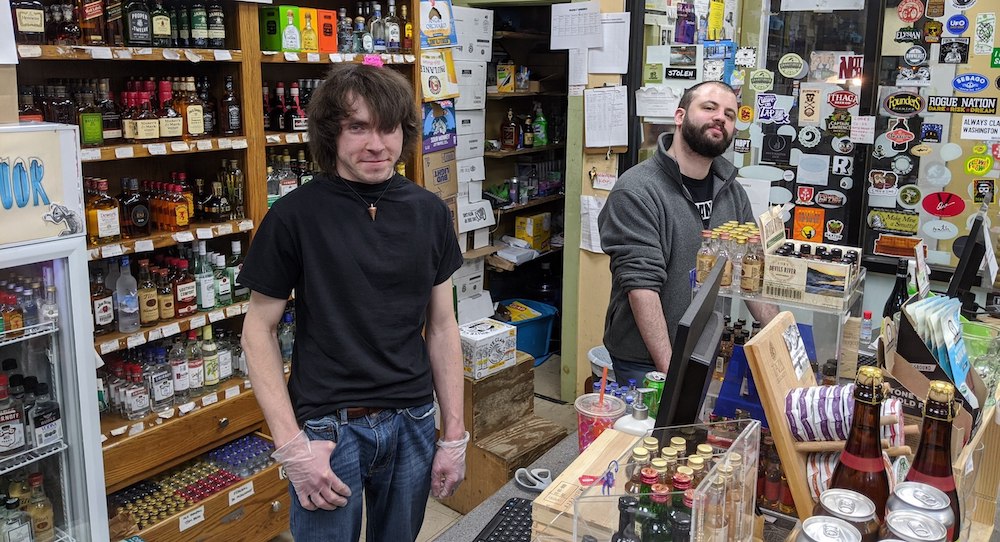Pictured in photo: Dave Goldenberg (left), Mario Epstein
“You’re not considered important until you’re really truly needed, such as in a time like this … I think anyone deemed essential needs a pay bump.”
As the coronavirus spreads respiratory distress all over the world, it has been more than a week since Massachusetts issued an emergency order requiring all businesses and organizations that do not provide “COVID-19 Essential Services” to close their physical workplaces and facilities to workers, customers and the public.
In the time since, the categorization of certain workers as essential has come as a surprise to some—including many of the workers themselves—as many are paid an hourly wage that doesn’t exactly scream “my boss and society consider my work essential.”
Grocery store workers, convenience and liquor store clerks, Dunkin’ Donuts employees, and gas station attendants are all part of the essential workforce making the Commonwealth go ’round these days. As most office workers settle into home routines, low-wage workers of all stripes continue stepping out into a world transformed by pestilence, with some transfixed by the fear of it.
In interviews, some people said they feel lucky to be among those considered so essential that they must risk getting sick so that their jobs don’t go unattended, and because their cash flow won’t be interrupted. Virus or not, bills need to be paid.
“I’m going in because it’s my job, and with a lot of people worried about not being able to work, I’m still capable,” Steve McCloud, the manager of Downtown Wine and Spirits in Somerville said. “I have a semi-obligation to go to work.”
McCloud notes that a handful of his employees are not coming in, and have opted out of spending eight hours a day handling money and interacting with the public. He’s not going to hold the decision against them.
“We’ve lost employees,” McCloud acknowledged. “None of them have contacted COVID-19 as far as I know, but they’re cautious. If someone doesn’t want to come into work because of this … I respect everyone’s decision.”
While he’s made the decision to continue showing up to a customer service job, albeit one in which he makes more than minimum wage as a manager, McCloud said he’s aware of the increased danger inherent in what was previously a very low-risk job. As a result, he is taking precautions.
“That’s honestly something that crosses my mind everyday,” he said. “I wash my hands more everyday, I carry hand sanitizer, and I wear gloves when I handle money.”
McCloud also noted that in normal times, a lot of shoppers overlook people who work retail jobs, and said people who work in the industry deserve a raise—even when there’s not a pandemic underscoring the importance of their roles. While some major retailers have announced wage hikes due to the current situation, such changes will only come to small businesses on a case-by-case basis.
“I think often in this society people underestimate the significance of retail workers, cashiers, people who stock the shelves … you’re not considered important until you’re really truly needed, such as in a time like this … I think anyone deemed essential needs a pay bump.”
McCloud said that some of his co-workers who have stayed on have received raises due to the events of recent weeks, and he’s heard of other local businesses doing the same. According to wage workers elsewhere, however, not all employers have the best interests of their employees at heart. Wages are one thing; basic safety is another.
One Walgreens worker at a Massachusetts store outside of Greater Boston said their managers have tolerated behavior that put the health and wellbeing of employees, as well as their families and the general public, at risk. According to the employee, despite the fact that two pharmacists tested positive for COVID-19 and were sent home to self-quarantine for two weeks, Walgreens did not require other employees to be tested, nor did they require that they be quarantined for two weeks. Instead, the worker said their Walgreens did a “deep cleaning” and opened the following morning.
In response to a request for comment, a Walgreens representative contradicted the employee’s contention that the store closed merely for an overnight cleaning, and said that all “impacted individuals who may be at risk” were contacted. This reporter contacted the company for comment on March 30, and received the following statement on April 1.
Walgreens was notified recently of two confirmed cases of COVID-19 in a New Bedford, MA store. The individuals have not been in a store since Friday, March 13. On Wednesday, March 25, we were also informed that a team member who works in this location was being evaluated for COVID-19, and has since been confirmed. That individual has not been in the store since Wednesday, March 25. In accordance with our established protocols and CDC guidance, we took immediate action to temporarily close the store for cleaning in order to disinfect the premises. We promptly notified and followed the guidance from the Bristol County Health Department. We have contacted impacted individuals who may be at risk and they are self-quarantined. The store reopened Sunday, March 29.
The Walgreens employee said the individuals referred to in the statement from Walgreens have been out of the store since March 19—not March 13. Adding, “They don’t mention that the deep cleaning took place on [March 28], which was three full days after the third confirmed case in the store. It almost gives the impression that they closed on [March 25] and reopened on [March 29]. They should have cleaned after the first test, not after the third confirmed case.”
“They said that we should all be fine because we weren’t exposed,” the anonymous employee said. “They consider being exposed working within six feet of someone for ten minutes or more. … I close the store, I handle the cash, I have to count all the money that goes through the pharmacy … We all assumed the store was going to close for two weeks and we were all going to be quarantined.”
In response to a request for comment, a Walgreens representative said, “We are looking into this and will provide a statement as soon as possible.”
This article was published in collaboration with Spare Change News.











